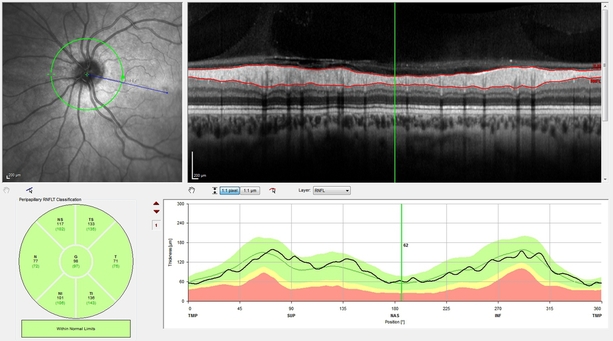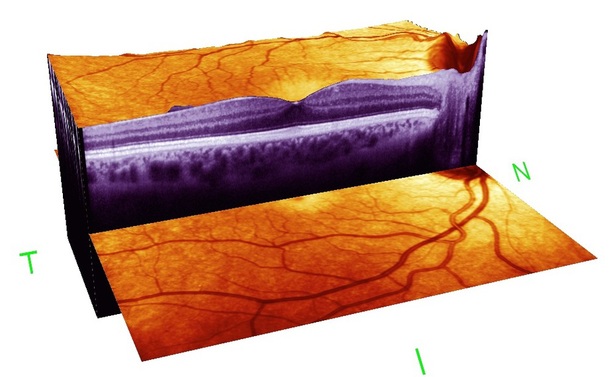Glaucoma
Find glaucoma up to 8 years sooner than standard eye tests. Book a Glaucoma Ultimate Ophthalmic Examination with us today by calling 01634 757227.
What is glaucoma?
Glaucoma is a very common eye condition, and is often called the silent thief of sight as it has no symptoms until it is well established, often creeping up and stealing your sight before you are even aware there is a problem. When symptoms do become noticeable, it's usually only when significant loss of vision (up to 40%) has occurred. It's therefore especially important that everyone at risk understands the need for regular advanced glaucoma eye examinations which can detect the condition 8 years before standard tests and long before you notice symptoms therefore stopping you needlessly losing your sight.
Glaucoma is a major cause of blindness in the world - Primary Open Angle Glaucoma. (POAG) being the most common form.
You do NOT need to have a family history of glaucoma to develop the condition. (although a strong family history does increase your risk)
The prevalence increases with age. Approximately 2% of the population have glaucoma. It is estimated that by 80 years old as many as one in ten people may have the condition (although a significant proportion are undiagnosed).
What causes glaucoma?
Inside your eye a fluid called the aqueous constantly circulates. This fluid exerts a pressure on the optic nerve at the back of your eye and the fine layers of nerves on your retina all day every day. If this pressure is too high or the nerves at the back of your eye have a weakness the nerve fibres will gradually be compressed. Left undetected or untreated the compression of the nerves causes them to gradually die off and stop functioning- the result of which is losing patches of vision possibly resulting in blindness. Glaucoma can affect anyone but certain groups are more susceptible including those with short-sightedness, poor circulation, diabetes, high blood pressure, migraine sufferers, or of African-Caribbean origin. The good news is that glaucoma is usually very manageable using eye drops and early diagnosis can prevent any significant vision loss at all in 90% of people who are diagnosed early.
Therefore early diagnosis is imperative. Although relevant, the traditional pressure test alone is not an accurate test for glaucoma. You do not need high intra-ocular pressures to develop glaucoma. If you have a nerve weakness, damage can occur even at low pressures. This is called Normal Tension Glaucoma. It is also equally possible to have very high pressures but if the nerves are strong, no damage may occur. This is called Ocular Hypertension.
Most opticians rely on pressure testing and visual field testing to detect glaucoma but using these traditional techniques alone can mean that up to 40% of the nerve fibre layer at the back of the eye may have already been lost by the time the tests show it up. Any nerve damage is permanent and therefore we need to detect nerve damage at a much earlier stage to allow us to save more of your eye sight. Happily, there is a better way ..
What is the best way to diagnose glaucoma, save your sight and monitor the condition?
You can lose 40% of your vision before you or standard visual field eye test may notice. Earlier detection is possible and can help you prevent any sight loss. Buchanan Optometrists offer a glaucoma Ultimate Ophthalmic examination which can offer early diagnosis as well as assessing your risk and monitoring the condition. Alisdair Buchanan explains the best way to detect tiny changes to your optic nerves is through Heidelberg OCT GMPE scanning and assessment by an experienced optometrist. 'A 4D scan (very different to the retinal photographs most opticians offer) can detect changes as small as 1000th of a mm. Far smaller than a human eye can ever detect. Using this technology we can now detect glaucoma up to 8 years sooner than standard eye tests.
I have glaucoma or a family history - What tests should I have done?
The monitoring of glaucoma in the UK is usually quite limited. Normally patients are seen in an NHS setting where they will have their visual fields carried out, visual disc assessment and pressure testing. Additional tests such as Heidelberg spectralis scanning are not currently available under the NHS.
The ideal detection and monitoring plan for anyone at risk of glaucoma, who has glaucoma or wants to find out if they have glaucoma is to have the following battery of tests carried out...
- Humphrey C24-2 Visual Fields
- Humphrey FDF Visual Fields (this is more sensitive to detecting early glaucoma and early changes)
- Goldmann Applanation pressure measurement
- Pachymetry (corneal thickness measurement)
- Anterior Chamber analysis (assessment of the front of the eye)
- Heidelberg Spectralis optic disc retinal nerve fibre analysis
- Heidelberg Spectralis macula retinal nerve fibre analysis
- Heidelberg GMPE scans
- Heidelberg Multicolour analysis
- Visual Optic disc assessment
We recommend this should be carried out at least once a year but preferably every 6 months. A full glaucoma assessment which includes all of the above tests is £390. All a small price to pay to protect your sight. This is the best eye screening for glaucoma using the latest technology available.
What are the latest treatments for glaucoma? Are drops still the best answer?
Eye drops to lower the pressure of the eye have traditionally been the first line of treatment for glaucoma. In most cases drops can work very well at stabilising the condition and preventing further progression. But they don't work for every case and some have unpleasant side effects. Drops can also be hard to administer for some people. Therefore new treatments which avoid eye drops have become increasingly popular. Laser treatments, stents, operations and new drugs may make your glaucoma treatment more effective and easier to manage. Ask our Optometrists about your particular case for advice.
Can what you eat and how you exercise affect your glaucoma?
There is some evidence suggesting that regular exercise can reduce eye pressure (IOP) on its own, and can also have a positive impact on other glaucoma risk factors including diabetes and high blood pressure. Some forms of glaucoma (such as closed-angle) are not responsive to the effects of exercise, and other forms of glaucoma (pigmentary glaucoma) may actually develop a temporary increase in IOP after vigorous exercise. So check with your Optometrist to see if exercise can help you.
Many studies have shown that eating leafy greens can have a measurable impact on glaucoma.
The thought is that certain vitamins and minerals have a protective influence on the retinal cells by acting as antioxidants, as well as increasing oxygen flow to the area therefore reducing the likelihood that pressures will damage the retina.
One study showed that consuming kale or collard greens just two or three servings a month was associated with half the risk of glaucoma compared to once a month or less.
Do vitamin tablets help?
There is no one single glaucoma tablet yet. But research shows vitamin C, Omega-3 fatty acids and many botanicals such as Ginkgo biloba and bilberry may also have a positive effect on glaucoma. Always ask your GP or ophthalmologist before starting a new diet or vitamins.
What else can you do to prevent glaucoma starting or progressing?
- Stop smoking. Cigarette smoke increases blood pressure and damages the tiny blood vessels in the eye, reducing the amount of oxygen reaching the retina.
- Ask your Optometrist if sleeping slightly elevated could help your condition. Studies suggest that sleeping with the head elevated 20-30 degrees reduces night-time IOP measurements compared with sleeping flat.
- Playing a wind instrument may lead to a transient increase in the intraocular pressure. Glaucoma patients who play these instruments should discuss this with their ophthalmologist.
To assess your risk or monitor your condition book a glaucoma ultimate Ophthalmic examination at award winning Buchanan Optometrists call 01634 757227.

Examples of Heidelberg 4D OCT eye scanning.

Closed angle glaucoma is a rarer form of glaucoma that can cause pain, blurring and quick onset sight loss. We can now scan your eyes and predict the likelihood of this occurring. If the scan identifies a risk you may, at any age, be entitled to preventative laser treatment which can stop closed angle glaucoma from occurring in the future.

Book a Glaucoma Ultimate Ophthalmic Examination with us today by calling 01634 757227.
Buchanan Optometrists - National Optician Award Winners





